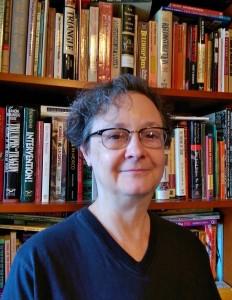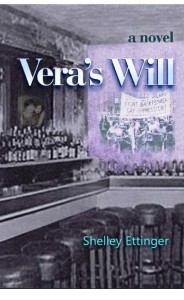 The Writers Who Read series continues this week with writer and activist Shelley Ettinger.
The Writers Who Read series continues this week with writer and activist Shelley Ettinger.
Who are you?
I’m Shelley Ettinger. I’m a longtime activist in the LGBTQ movement and in anti-racist, anti-war and union struggles. I began writing creatively about 15 years ago; since then my poetry and short fiction have been published in dozens of literary journals. My first novel, Vera’s Will, was just published by Hamilton Stone Editions. It’s the story of a woman who loses custody of her children in the 1920s because she’s a lesbian, of the repercussions for her family down the generations, and of her granddaughter who comes out of the closet and becomes an activist 50 years later without ever knowing about her grandmother. I’m thrilled to report that Library Journal gave Vera’s Will a starred review, and called it “a breathtaking achievement.”
What are three beloved books you first read before the age of 12?
Well I’m so damned old at this point — yep, I’m a 60-year-old first novelist — that it’s hard to remember. My best guesses: Hawaii by Leon Uris, Murder on the Orient Express by Agatha Christie, and A Wrinkle in Time by Madeleine L’Engle. I kind of hate to admit to each of these because politically and artistically these books and/or authors are nothing I’d recommend now. But at 12 my reading horizons had yet to expand.
What is one book you are always recommending to friends and family (and maybe the local barista) as an adult?
The two greatest English-language books are, in my opinion, Beloved by Toni Morrison and Mrs. Dalloway by Virginia Woolf; if someone asks me for that recommendation, best book period, I’ll usually go with one of these. For those who might not be up to the work reading either of these books entails, I might recommend Death of a River Guide by Richard Flanagan or Affinity by Sarah Waters.
What is your book kryptonite–those unique elements in a book, beyond just great writing and three-dimensional characters, that make you unable to resist reading?
What I’m always looking for is left-wing political fiction. A book that combines mastery of language with a story that illustrates something about the working-class struggle, about racism or women’s or LGBTQ oppression. Contrary to the literary establishment’s rules in this country–and only in this country–that there can be no such thing as good political fiction, I say there can be and there is, and it’s what I want to read.
What is your ideal time and place to read?
Morning, in the sun room of my apartment, with coffee. Also: anytime and everywhere. I do a great deal of reading on the subway riding to and from work every day. I always have a book with me, and am always reading if I’m not forced to be doing something else.
Which books have had the biggest influence on your writing?
It’s hard to figure out as I’ve read so much that I think it’s cumulative, a confluence. For rigor, depth and complexity, though, it has to be Toni Morrison’s books. Also those of Joyce Carol Oates. There’s a flip side, too: I think I’ve been made a better writer by learning what not to do from many books I’ve read, or started to read and gave up on. Flat, trite language and shallow insipid content are the worst horrors.
How do you balance reading and writing in your life?
I haven’t been writing in recent months, since the publication of my novel Vera’s Will and the resultant promotional work that’s been pretty consuming. I hope to get back to work on my second novel soon. Once I do, I’ll encounter my biggest challenge: how to discipline myself away from wanting to sit in a chair and read all the time and toward sitting at a desk to write. I’ll probably set up some sort of write-to-read ratio and try to stick to it, like for every two hours I write I’m allowed to read for one.
Choose your preferred book form: ebook, physical book, or audio book?
I read, both physical books and ebooks. I started reading ebooks because my back was rebelling against carrying around fat heavy books all the time, but I do still prefer a physical book if its heft isn’t too great.
Do you consciously plan your future reading–i.e., set book goals, keep a TBR list, participate in book challenges or book clubs? Why or why not?
I have a long and constantly expanding To Read list. Three lists, actually: fiction, non-fiction, and poetry.
What are you reading now?
I just finished Mr. Loverman by Bernardine Evaristo, and am about to start Migratory Animals by Mary Helen Specht.
You can learn more about Shelley on the Vera’s Will Facebook page or her website.
